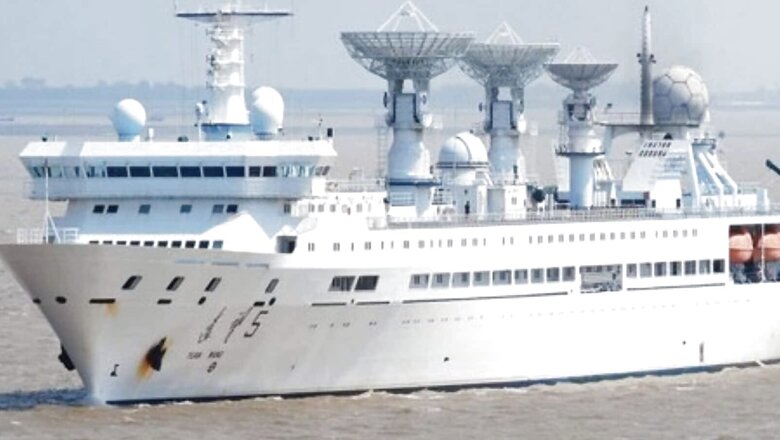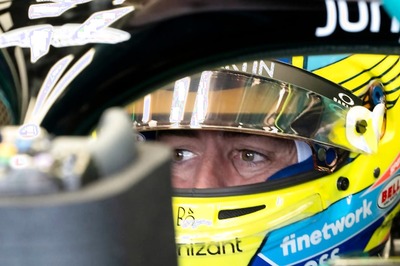
views
The Sri Lankan government’s predicament and its inability to refuse the docking of a Chinese spy ship at the Hambantota Port speaks a lot about its fast-losing grip on the island country to Beijing’s sturdy influence. But more than that, it spells out China’s determination to exert undue control over smaller countries by blackmailing them after dragging them into a debt trap.
If only Sri Lanka had understood the reason behind India’s refusal to develop Hambantota port, if only Colombo would not have been lured by the Chinese reasoning to sign an agreement to accept Chinese loan and allowed Chinese engineers, technicians, and labourers for an ambitious port project, then the plight that this country is currently undergoing perhaps could have been averted or managed well.
India understood that the Hambantota Port Project would not be commercially viable. China too was conscious of it, but then China had other strategic plans in mind. It gave a huge amount of loans to Sri Lanka, built the port, and demanded repayment of the loan. Sri Lanka could not even service the debt and then Beijing coerced Colombo to hand it over to China for operating the port under a 99-year lease!
Sri Lanka, China, and the world have been witnessing how the commercial performance of the Hambantota Port is a big fiasco. But the same port is now available to China for military use! When many strategic analysts in India and the United States feared China’s string of pearls strategy to encircle India and extend Chinese domination over the Indian Ocean region, critics were not small in number.
Now that China has coerced Sri Lanka and got permission to dock its naval vessel Yuan Wang-5 at Hambantota, the curtain over the real Chinese intention has been raised. China calls it a research vessel, but it is a recognised fact that the ship is equipped with sophisticated machines to track satellites and even ballistic missiles. It is not for nothing that India and the United States have expressed concerns over the Chinese vessel’s docking at the Hambantota Port. The port’s naval/military utility is now for all to see.
When Sri Lanka requested China to defer this visit indefinitely, Beijing reacted furiously and put in another request with a new date. Simultaneously, it pointed a finger at India for pressuring the Sri Lankan government against giving official permission to the Chinese vessel. By doing so, China inadvertently revealed its real intention. The Chinese strategic design aims at spying on Indian naval, nuclear, and other military facilities, since the equipment in Yuan Wang-5 has a range of about 750 kilometres. Otherwise, there was no need for pontificating India about what kind of relations it should have with Sri Lanka.
By default, Beijing’s coercive diplomacy actually came to light when Colombo was forced to accede to the Chinese government’s desire to deploy Yuan Wang-5 weeks after Sri Lanka requested a deferment. The main obligatory factor was also perhaps the Chinese de facto control over Hambantota Port where Sri Lanka now exercises only nominal sovereignty. What Sri Lanka’s political elite, including leaders, need to realise is the pitfall of befriending Beijing.
When it comes to saving Sri Lanka from chaos and economic challenges, India has always been there to help and often as the first responder. Sri Lanka approached China for $4 billion in assistance to tide over the current economic crisis. Beijing has, of course, promised assistance. But India has already assisted to the tune of an equivalent amount of aid. When the tsunami hit Sri Lanka in 2004 causing death and destruction, it was India that was part of a Quad that came to its rescue and not China. When Sri Lanka faced food, fuel, and medicine shortages more recently, it was India, and not China, that responded fast. Only a day before Yuan Wang-5 docked at the Sri Lankan port, it was India that donated Dornier maritime patrol craft for security purposes.
It is high time Sri Lanka’s ruling class woke up to the reality that India’s assistance is for the country’s needs and security, but China provides loans to do business, make profits, and garner geopolitical concessions. Dornier will help Sri Lanka combat non-traditional security threats, such as drugs trafficking and smuggling, whereas Yuan Wang-5 has caused security anxiety in the region and may collect secret intelligence information through tracking and surveillance — not for regional security but for boosting Chinese efforts to spread its hegemonic sway over the Indian Ocean region.
It is also imperative for India to take appropriate note that Yuan Wang-5’s docking at Hambantota Port in close proximity to the Indian security perimeter is not going to be a first and last-time affair. Worse is perhaps yet to come. Different kinds of Chinese naval activities in Sri Lankan ports are likely to take place. Corrective measures need to be debated and deliberated to protect India’s security interests.
In addition, legal minds should examine if at all something can be done to do away with the 99-year lease of Sri Lanka’s Hambantota Port to China. It was perhaps important for the international community, including India, to have tried to rescue Sri Lanka from the Chinese debt trap before the lease agreement was initialled.
Sri Lanka’s strategic location enhances the necessity for protecting it from Chinese shrewd and no-so-subtle traps and encroachments for the safety, security, and stability of the Indo-Pacific, especially the Indian Ocean Region. Chinese behaviour in the Taiwan Strait is a loud and clear wake-up call for all, particularly small states in the larger region.
Chintamani Mahapatra is editor, ‘Indian Foreign Affairs Journal’, founder and Honorary Chairperson of Kalinga Institute of Indo-Pacific Studies, and formerly professor of JNU. The views expressed in this article are those of the author and do not represent the stand of this publication.
Read the Latest News and Breaking News here




















Comments
0 comment